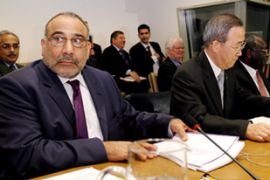UN urges Iraq development support
Iraqi vice-president presents ambitious five-year plan to revive the economy.

The compact, which was discussed by more than 80 countries, was set up by the UN and the Iraqi government shortly after Nuri al-Maliki, Iraq‘s prime minister, took office in June 2006.
The conference’s purpose was not to secure financial assistance for Iraq, but to allow the government to present its budget and legislative agenda to the international community in the hope of getting support for its plans ahead of a donor conference.
No launch date
Abdul-Mahdi had said the conference participants would choose a date and place for the adoption of the compact, but they did not. Ibrahim Gambari, the UN chair of the compact, said the launch would happen before April 30 in a location yet to be determined.
Gambari said that several countries have already said they will forgive about $4bn in Iraqi debt.
| Your Views |
The package that Abdul-Mahdi presented included provisions for an oil-profit sharing law, which he predicted the Iraqi parliament would adopt in the coming weeks, a plan for drawing foreign investment into the country, and a fully funded budget for 2007, in which spending on education and health is double that of 2006.
It also contains political initiatives aimed at healing the sectarian rift that has developed since the US-led invasion. The government proposed a national reconciliation project, including amnesty for fighters who renounce violence, reversing measures that have excluded many former members of Saddam Hussein’s ruling Baath party from the government, and the creation of a human rights commission.
Ban, who convened the conference, acknowledged that security and the humanitarian situations in Iraq are deteriorating.
He said: “The challenges ahead are immense. I am sure you will all agree that we cannot leave Iraq on its own to cope with them.
“Beyond the political violence and sectarian strife, a humanitarian crisis is stretching the patience and ability of ordinary people to cope with everyday life.”
‘Normalisation’ required
In light of the violence, Ban said, many may question the appropriateness of the compact.
He said: “However, a framework for normalisation is required now more than ever.”
The secretary-general said he was also aware that there are “a multitude of initiatives on Iraq” which have yet to yield tangible results. These need to be streamlined and consolidated to concentrate on achievable goals, he said.
Ban said: “But unlike the other initiatives, the compact focuses on Iraq‘s long-term economic development, while also stressing progress in the political and security fields.”
Robert Kimmitt, deputy treasury secretary, who led the US delegation, said the launch would provide an opportunity for foreign powers to respond to the Iraqi proposals and pledge financial assistance.
Kimmitt and others who attended the conference stressed that economic reform must go forward where it can, despite the violence.
He said: “In this business, you don’t do things sequentially. You have to do it in a co-ordinated fashion.
“There are places in Iraq already that are secure enough to provide reconstruction, other essential services to the Iraqi people, and we should move to do that. And when other areas become secure, we need to be ready to do that.”
Gambari, the former UN undersecretary-general for political affairs, said: “We cannot wait until every situation on security is perfect before we move to support the government of Iraq in their commitment to economic reform.”